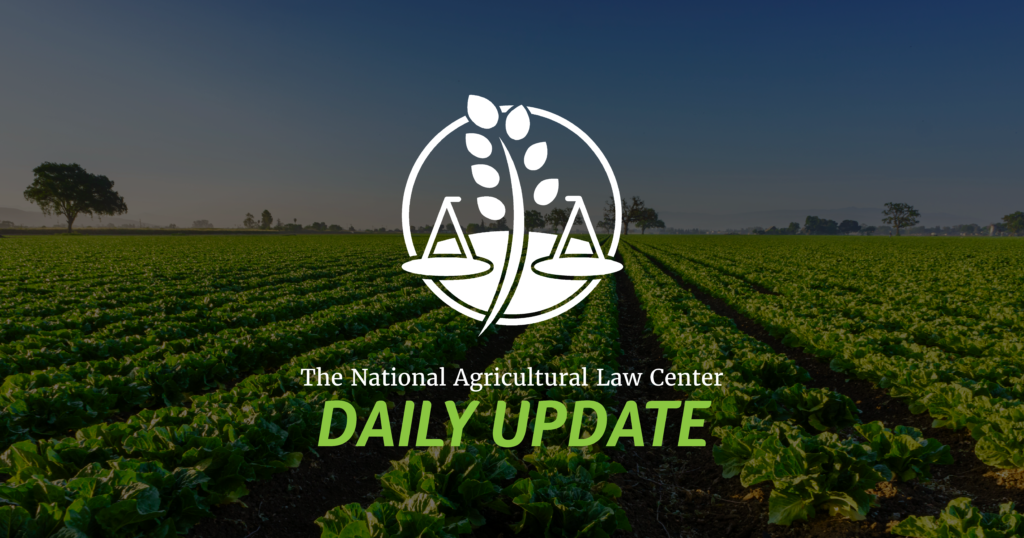A comprehensive summary of today’s judicial, legislative, and regulatory developments in agriculture and food. Email important additions HERE.
JUDICIAL: Includes Clean Water Act, Fair Labor Standards Act
In Shark River Cleanup Coal. v. Twp. of Wall, No. 21-2060 (3rd Cir. Aug. 24, 2022), the Third Circuit Court of Appeals considered what information a plaintiff must include in the notice provided to a defendant alerting them that the plaintiff intends to file a Clean Water Act (“CWA”) citizen suit against them. Under the CWA, any party looking to initiate a citizen suit, must first provide notice to the alleged violator informing them of the alleged violation, and the possibility of a future lawsuit. The notice must be issued sixty days prior to the prior to the plaintiff filing suit, and must contain enough information so that the recipient may identify the “components of an alleged violation” including the exact provision of the CWA that has allegedly been violated. Both of these elements are necessary to give the alleged violator time to come into full compliance with the CWA in order to avoid a lawsuit.
In this lawsuit, the plaintiffs claim to have discovered a subterranean sewer line owned and operated by the defendants that no longer remained underground, possibly due to erosion. The plaintiffs notified the defendant that they intended to file a CWA citizen suit. After the citizen suit was filed, the defendants asked the court to dismiss the case, arguing that the notice supplied by the defendants did not include sufficient information to allow the defendants to identify the specific CWA provision that was violated. Along with failing to specify the provision of the CWA that had allegedly been violated, the notice also failed to contain information regarding the location of the exposed sewer line. Although the court ultimately agreed with the defendant that the notice provided by the plaintiff had been insufficient, it also concluded that the notice had provided enough information for the defendants to locate the alleged violation. The exposed sewer line was located on an easement taken through eminent domain by the defendant. Because the notice referenced the public records of the easement, it was “just barely” enough to allow the defendants to locate the sewer line. However, the court found that because the notice referred to the entire CWA – as opposed to a particular provision – as well as several state laws, the notice failed to inform the defendants what CWA provisions the plaintiffs were claiming had been violated. Therefore, the court found the notice to be insufficient and dismissed the case.
In Luna Vanegas v. Signet Builders, Inc., No. 21-2644 (7th Cir. Aug. 19, 2022), the Seventh Circuit Court of Appeals reversed a lower court decision to dismiss the plaintiff’s claims of Fair Labor Standards Act (“FLSA”) violations, finding that the question raised by the plaintiff was so fact-intensive that it could not be decided merely by looking at the plaintiff’s complaint. In 2019, the defendant hired the plaintiff to build livestock confinement facilities in Wisconsin and Indiana. According to the plaintiff, he routinely worked more than 40 hours a week, but the defendant refused to pay the overtime rate required under FLSA. After the plaintiff filed suit, the defendant asked that the lawsuit be dismissed, claiming that the plaintiff’s construction activities fell under FLSA’s agricultural exemption.
Under FLSA, employers are required to pay eligible workers at least one and half times their regular wage for any time worked beyond the 40-hour work week. However, this requirement does not extend to employees that are “employed in agriculture.” FLSA defines agricultural work into two categories: primary agriculture, which includes “farming in all of its branches” such as the raising of livestock; and secondary agriculture, which includes any activities “performed by a farmer or on a farm as an incident to or in conjunction with farming operations.” In order to determine whether the agricultural exemption applied to the plaintiff, the court had to determine whether the plaintiff’s construction work was “an incident to or in conjunction with” the farming operations of the livestock farmers that the confinement facilities were built for. While the lower court reviewed the facts presented in the plaintiff’s complaint and determined that the agricultural exemption applied, the Seventh Circuit concluded that such a determination could not be made off of the complaint alone. The Seventh Circuit noted that the FLSA regulations state that work will only fall into the secondary agriculture category if it is both “performed by a farmer or on a farm” and if it “does not amount to an independent business.” Additionally, the regulations lay out multiple factors that must be examined on a case-by-case basis to determine whether the secondary agricultural exemption applies. Because the lower court did not apply this fact-intensive test, the Seventh Circuit found that it should not have dismissed the case. Therefore, the lawsuit was sent back to the lower court for further proceedings.
